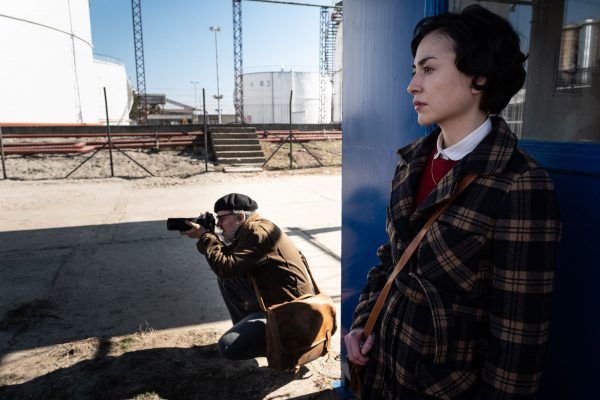Hot on the heels of the release of Todd Haynes’ Dark Waters, in comes director Andrew Levitas’ second feature film, Minamata. As another movie based on a true story that involves the little guy going up against a major corporation, it’s impossible not to draw comparisons to Dark Waters and perhaps one of the most well known of the bunch, Erin Brockovich. But, the multitude of films covering similar situations seems necessary for two reasons. First off, I knew little to nothing about Minamata disease; clearly there’s a need to raise awareness. And secondly, having multiple movies covering similar situations, not just in the United States, but throughout the world, further puts into focus the problems that run rampant throughout global business practices and the devastating long-term effects of such behavior.
Minamata takes place in the 1970s and stars Johnny Depp as acclaimed photojournalist W. Eugene Smith. Since capturing some of his most renowned photos during World War II, Eugene has lost touch with the outside world, his own children and also with his career. However, after being approached by Aileen Mioko (Minami) for what he thinks is just an advertisement for Fuji Film, he’s tempted to take on another assignment in the city of Minamata to capture the effects of mercury poisoning on the local population.
Whereas the truth of the story is downright shattering and there’s much to commend in the production itself, the final product still winds up feeling like a plain old fine retelling. Depp does manage to successfully convey the complexities of Eugene’s current headspace and how this assignment unearths his early determination. (And there’s also the added fascination that comes with seeing someone like Depp lose himself in the hair and make-up required for the role, especially when it's not in the “dress-up” sense like with many of his recent projects.)
The production and costume design teams appear to have met the immense challenge of recreating Minamata in the early 70s with great detail. And then cinematographer Benoît Delhomme captures it all with a stunning mix of sensitivity and intensity through his handheld approach that manages to highlight both the familial love and devotion throughout the city and also the devastating threat that they can’t outrun. Having those two qualities on display full force, almost from start to finish, is what eats away at you more than anything, an aching frustration that comes from seeing the wrong and the hurt so clearly and not being able to do anything about it.
The visuals in Minamata and the more detailed understanding of what truly happened to thousands of innocent victims is unshakable, but that can be said of any remarkable true story conveyed through any medium with varying degrees of artistry and emotional heft. So the question becomes, is Minamata still on my mind because of how Levitas’ tells the story in his film or is it the information itself?
Even though every single department of this company delivers, there’s still something flat about the final film with the knowledge that this is a true story often overshadowing the characters themselves. While this might have something to do with the script’s rather formulaic plot progression, I also suspect it’s a direct result of feeling a bit distanced from the main players, Eugene in particular. While there is great nuance in Depp’s performance and he very clearly conveys the push-pull of his situation, the portrayal is still missing that quality that encourages a viewer to lean in and feel invested in Eugene’s personal failure or success. Yes, the Minamata Movement’s victory is what’s truly important here, but as Eugene is meant to be the anchor of the film, emotional detachment from him often makes the viewers more of a fly on the wall rather than a thoroughly invested participant.
Minamata is a serviceable watch for anyone looking to learn more about the true story and about what happened to Smith while trying to capture it. It’s well paced, beautifully filmed and does have an appealing classic feel to it, but it still lacks that spark to propel it from informative to all-consuming.
Grade: B-



